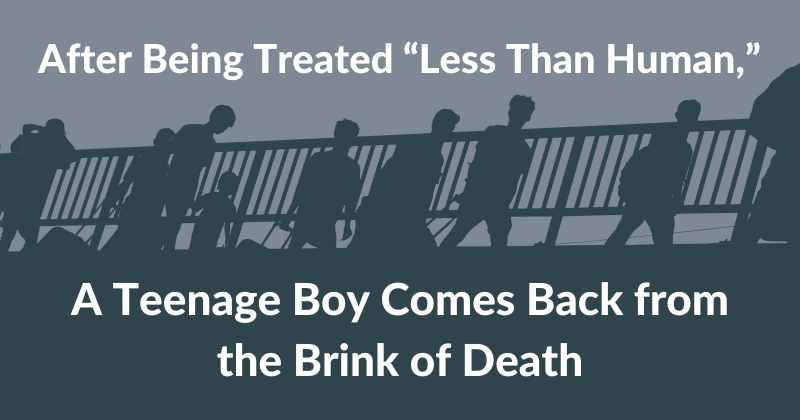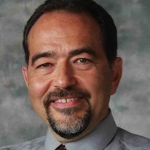Health Justice in 2023: After Being Treated “Less Than Human,” A Teenage Boy Comes Back from the Brink of Death

[Editor’s note: This piece comes from Laszlo Madaras, MD, MPH, Chief Medical Officer of Migrant Clinicians Network, who spent some time over the Martin Luther King, Jr. weekend to catch up on Health Network cases that are completed. Once a Health Network Associate determines along with the patient that the patient no longer needs Health Network’s assistance, Dr. Madaras reviews the case notes before setting the case to close.]
When the emergency department received 16-year-old Jorge,* he was unresponsive and intubated. He was found among many dead migrants in the back of a truck in extreme heat, at the US-Mexico border, a smuggling attempt gone wrong. The ED packed his body in ice, since it measured above 105 degrees. His doctors determined he was experiencing numerous potentially life-ending conditions, including muscle breakdown, cardiogenic shock, kidney failure, and shock gut due to severe dehydration. There was a right thigh injury with tensely swollen soft tissue without a bone fracture, which was suspected due to a pressure crush injury when a heavy weight such as one or more other human bodies are lying on top for a prolonged period of time. If that was not enough, he had lactic acidosis and developed disseminated intravascular coagulation -- when the injured body's clotting factors cause abnormal blood clotting throughout the body's blood vessels. In short, he was likely minutes to hours from death.
And yet, Jorge pulled through. What he had going for him was youth and an amazing will to live. His young lungs had good compliance and, once the ambulance arrived, the ventilator bought him enough time for healing. Each one of his conditions slowly improved and he was extubated and began the long process of recovery.
Less than two months later, Jorge was rapidly improving – and starting to act like a typical boy of his age. He ordered a fast food sandwich from his bedside. He wanted to play soccer, go to church. Just a few weeks after that, he was up and learning to walk with physical therapy. The therapist recorded that he was able to balance on his injured thigh and kick a soccer ball into the goal ten times.

About two weeks after he began walking, and almost exactly two months after the harrowing end to his migration, Jorge was enrolled in Health Network’s Specialty Care Access Network (SCAN) by his physician at the border hospital. He was ready to leave the border and continue to on to his receiving community, where he would await his immigration hearing, and where he would need to continue specialty care to continue the process of healing. SCAN would assist Jorge in accessing hard-to-reach and expensive specialty care.
On the day of enrollment, Camila, Health Network Associate, called Jorge’s mother, who was with Jorge in his receiving community, to explain how Health Network and SCAN could help. She said she needed help getting Jorge medical insurance, and that Jorge had one appointment already scheduled. In this case, Health Network did not assist with appointments, as the family had already found care, but instead worked to connect the family with services to help them manage their needs outside of doctor’s appointments, to make sure they could keep up care.
The family was reeling from the medical bills that were beginning to pile up. Jorge would need to connect with a kidney doctor, neurologist, and physical therapist to help his body continue to recuperate from near-death. Jorge’s mother needed legal assistance, help with paying bills, and access to a food pantry.
Camila worked diligently to find these services, and followed up regularly. At one point, the mother messaged Camila, saying she needed help to understand what to do with the bill from Jorge’s most recent appointment. Camila called the hospital where Jorge attended and helped Jorge’s mother connect with the hospital on a Spanish language line. After two months, Jorge’s mother let Camila know that they were able to sort out payments with the hospital with the contact that Camila provided. A few weeks later, his mother let us know that he is now well connected to health care services including mental health, and that they need no further assistance from MCN at this time.
Over the Martin Luther King holiday weekend, I closed Jorge’s case, simultaneously feeling sorrow, pride, dismay, and satisfaction. Dr. King had a dream that one day his children and all children would be judged not by the color of their skin but by the content of their character. Over half a century later, we are still not there. I look around in sadness and horror and anger that any people could be transported as human cargo across borders and be left to die as if they were less than human beings. The extensive medical services that this child received were excellent and could have happened in very few other places outside the United States, but the circumstances that put him in a situation that required this level of care also are happening in the US.
MCN continues to work for social justice, toward the dream of Dr. King. On many different fronts, we work to protect the vulnerable from heat injury, infectious disease, and economic injustice, and help move toward recovery after natural disasters. Health Network is a part of all of that work, and I am very proud of our Health Network Associates who do this important work, as shown by this one case and many other cases. That we could do ANYTHING to help move this young patient toward improving his condition in any way is a cause for celebration despite everything else. As we begin 2023, I know we are fighting the good fight, and I am in the right place at the right time with the right people who do this work.
Learn more about SCAN on our SCAN webpage.
SCAN is an initiative of Health Network. Read about Health Network and other Health Network initiatives here.
Read other case studies at our #HealthNetworkHelpsPeople page.
Support this critical, life-saving work – MCN needs funding to make it happen. Donate today. You can become a regular sponsor of MCN so your donations can continue to support virtual case management for migrants throughout the year.
- Log in to post comments
